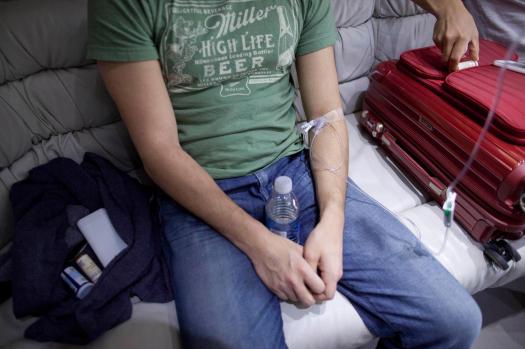By Associated Press’s Tom Murph
With promises of speedy recovery from a strenuous workout or a hangover, IV treatment clinics are popping up all over the nation. However, authorities and physicians advise caution.
Since the COVID-19 epidemic, the services have expanded rapidly, providing drips that claim to strengthen immune systems, increase energy, or ease joint pain. Intravenous fluid bags, which are typically seen hanging next to hospital beds, are used for this.
For a combination of vitamins and supplements that would be significantly less expensive in tablet form, customers may need to pay up to several hundred dollars per session.
Advocates claim that compared to ingesting pills, this method allows users to hydrate more quickly and absorb more of a vitamin or supplement.
However, according to Dr. Sam Torbati, co-chair of emergency medicine at Cedars-Sinai Medical Center in Los Angeles, the therapy mostly helps patients produce costly urine as the body rids itself of unnecessary substances.
Related Articles
-
Burns and fireworks injuries: What to do when seconds count this July 4th
-
Not accountable to anyone : As insurers issue denials, some patients run out of options
-
FDA vaccine official restricted COVID vaccine approvals against the advice of agency staff
-
RSV vaccine access expanded to some people in their 50s, according to CDC website
-
Gun suicides in US reached record high in 2023
They are difficult to count in part because some companies only give IV therapy, while others do it as a component of a medical spa.
According to the American IV Association, an industry association, the technique gained popularity during COVID-19, when people’s access to doctors became constrained and their concerns about the health of their immune systems increased.
In Ohio, where there are already over 200 clinics, regulators are keeping a careful eye on the trend. According to Ohio Board of Pharmacy spokesman Cameron McNamee, these companies were almost unknown there prior to the pandemic.
Before beginning any treatment, doctors advise asking some insightful questions.
According to Torbati, customers should inquire about the length of time and training of the individual administering the IV.
They ought to be aware of what’s in the IV drip as well. For example, the Restore Hyper Wellness franchise’s Wonder Juice therapy blends six vitamins and supplements that are sold in pharmacy stores in oral form.
If someone has an allergic response, it helps to know all the ingredients.
Inquire about the source of the company’s medications, if any are used. “A licensed pharmaceutical wholesaler should be the answer,” McNamee said.
Otherwise, the medication can be inferior or fake. The licenses of companies that bought narcotics on Facebook have been suspended by Ohio authorities.
When visiting, clients should also confirm that the clinic is in good condition.
According to McNamee, the IV room is most likely unclean if the office isn’t.
They object to the fact that a paramedic or nurse frequently assists a patient in selecting an IV therapy before administering the treatment. A physician, physician assistant, or nurse practitioner should be involved, according to several state regulators, though regulations can vary.
Standing orders, which are given by doctors with the intention of granting nurses or paramedics authorization to treat patients in accordance with specific procedures, are frequently used by the clinics.
Dr. Chris Seitz, an emergency physician and chairman of the scientific advisory board of the American IV Association, said hospital emergency departments frequently follow the same type of directives.
In the emergency room, many nurses saw patients before I could reach them and started IV fluids, he added.
Regulators are also concerned about how consumers choose their own medical care.
According to a March statement from Kentucky officials, a patient cannot approach a hospital or doctor’s office and request an IV any more than a patient may order their own appendectomy.
However, according to Seitz, any healthcare provider and the patient should work together to help the patient make the best choice.
According to him, patients have a desire and a necessity to be in charge of their own health.
Compounding, the process of combining chemicals for certain treatments, is another concern that is fueled by patient choice.
In a 2023 statement, South Carolina authorities stated that this should be the outcome of a legitimate care professional order rather than a fast-food restaurant-style patient-driven menu.
Proponents counter that mixing prescription medications in a lab is not the same as adding vitamins or medications to an intravenous therapy.
In terms of clinical complexity, it’s just low-hanging fruit, according to Jeff Cohen, one of the co-founders of the American IV Association.
Clinics for IV treatment do offer some care. They can support pregnant women and cancer patients in maintaining proper hydration. Migraine discomfort can be relieved by certain treatments.
However, many drips necessitate the development of a safe, soluble vitamin or supplement that may be administered intravenously. According to Torbati, that is more costly to produce than a vitamin, which can just cost a few cents per pill.
Consumers will have to decide if the extra cost is worthwhile.
According to him, all of that costly therapy usually pees out in eight hours.
The Science and Educational Media Group of the Howard Hughes Medical Institute provides support to the Associated Press Health and Science Department. All content is entirely the AP’s responsibility.











